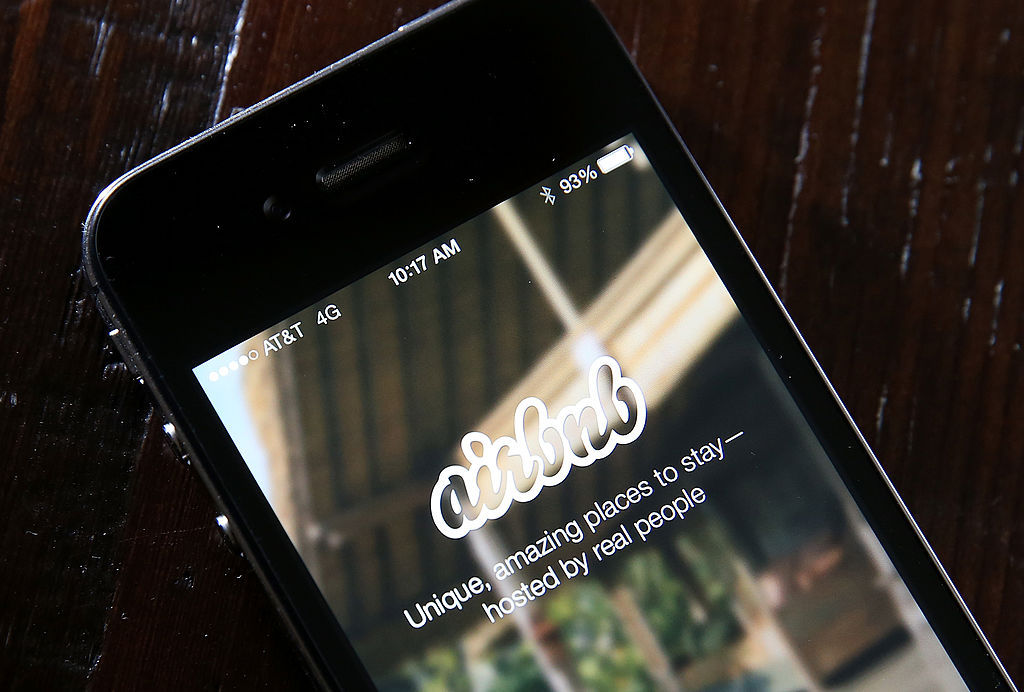Now Is the Perfect Time to Crack Down on Airbnb
Airbnb bookings have completely collapsed during coronavirus, creating huge numbers of empty properties in the very cities that are suffering the worst housing crises. It's a perfect time to crack down on Airbnb — including by public seizing of Airbnb units.

After years of making life more difficult for residents in cities around the world, the pandemic has placed Airbnb at the mercy of governments and its investors. (Illustration by Justin Sullivan / Getty Images)
Airbnb has been the menace of major cities for years. The service has been credibly accused of increasing housing costs when units are converted into short-term lets, while residents complain that Airbnb damages their communities. Across Europe, governments have placed restrictions and regulations on the service with varying degrees of success, as illustrated by the fact that nearly a quarter of the listings in London were thought to be in violation of the city’s ninety-day limit in May 2019.
At the beginning of this year, governments were continuing to fight the rental platform, with eight European cities having appealed a favorable EU ruling that found the company didn’t need an estate agent license. French tax authorities were demanding data to investigate hosts for tax avoidance, while Scotland passed new laws to allow local authorities to regulate short-term lets.
But then the pandemic hit, nearly killing the travel industry overnight and firmly shifting the balance of power from Airbnb to governments.
Some Airbnb hosts fumed at the lack of support they received from the company, but there is little sympathy for people who’ve been profiting by taking housing off the rental market for years. After bookings plummeted as much as 96 percent in some cities, the company laid off 1,900 workers and cut non-essential spending.
As it became clear this would be an extended crisis and travel wouldn’t be swiftly resuming, short-term lets started migrating back to the long-term rental market. In Dublin, for example, there was a 64 percent rise in rental listings in March, while rents dropped by their largest amount in a decade in April. Similar trends have been observed in Australia, Canada, and across Europe. After claiming for years that its service didn’t increase rents, Airbnb was proved definitively wrong.
European cities have made it clear they’ll use their new power to crack down on Airbnb. Scotland’s decision to give business grants to certain Airbnb hosts angered some councillors in Edinburgh, but they hope to use the data collected from the process to increase enforcement. Meanwhile, Lisbon was hailed for creating a new scheme to bring more Airbnbs back into the long-term rental market, but it exempts landlords from property and capital gains taxes. That seems like generous treatment for people who helped intensify the city’s housing crisis. Thankfully, other governments are proposing a more radical approach.
In Paris, Ian Brossat, the deputy mayor in charge of housing, said the city intended to “regain control” and “could buy up some of these apartments and return them to the traditional rental market.” After winning reelection earlier this month, mayor Anne Hidalgo also committed to a referendum to limit the maximum number of days a year that short-term lets can be rented. It’s likely to take place in November.
Similarly, despite Ireland’s new government being a right-wing coalition, Housing Minister Darragh O’Brien is drawing up plans for the state to buy Airbnb properties. He told TheJournal.ie, “If there are opportunities for the state to buy, at reasonable prices, so we can house people and then they can rent them on a secure basis from the state, then we should.”
After years of fighting Airbnb with regulations that it almost always finds a way to evade or ignore, the prospect of Paris and Ireland taking over Airbnb units should not only be welcomed, but residents in other cities should demand their governments do the same. Cities should use the upper hand they’ve gained from the pandemic not only to ban the listing of entire homes on Airbnb — if not the entire platform — but to take the properties that were listed on those platforms into public ownership.
Those units could be quickly turned into social housing for homeless people in shelters, temporary accommodations, or who remain on the street. But taking on Airbnb should just be one part of a broader strategy to ensure housing meets the needs of residents, not investors. Rents may be temporarily down in many cities, but it’s unlikely they’ll remain that way without more serious action.
With evictions crises looming in the United States and the UK, there is a need not just for continued protections to keep people in their homes, but for a major investment in social housing that would not only provide people with secure lodging, but would create jobs in a cratering economy. The call by council leaders across the UK for the construction of 100,000 new social homes for key workers is a great place to start.
After years of making life more difficult for residents in cities around the world, the pandemic has placed Airbnb at the mercy of governments and its investors — and its power won’t return anytime soon. Cities have a rare opportunity to expel the company, take over the units that existed solely to serve tourists, and ensure any letting in future is properly regulated. Governments would be wrong to squander it.